Warehouse managers are responsible for overseeing the storage, distribution, and inventory of goods in a warehouse. They ensure that operations run smoothly, from receiving shipments to dispatching orders, while maintaining safety and efficiency.
Skills required for a warehouse manager include knowledge of inventory management systems, leadership abilities, and strong organizational skills. Additionally, they must be adept at problem-solving and effective communication.
Candidates can write these abilities in their resumes, but you can’t verify them without on-the-job Warehouse Manager skill tests.
In this post, we will explore 9 essential Warehouse Manager skills, 11 secondary skills and how to assess them so you can make informed hiring decisions.
Table of contents
9 fundamental Warehouse Manager skills and traits
The best skills for Warehouse Managers include Inventory Management, Logistics Coordination, Data Analysis, Safety Compliance, Technology Proficiency, Quality Control, Budget Management, Vendor Relations and Problem Solving.
Let’s dive into the details by examining the 9 essential skills of a Warehouse Manager.
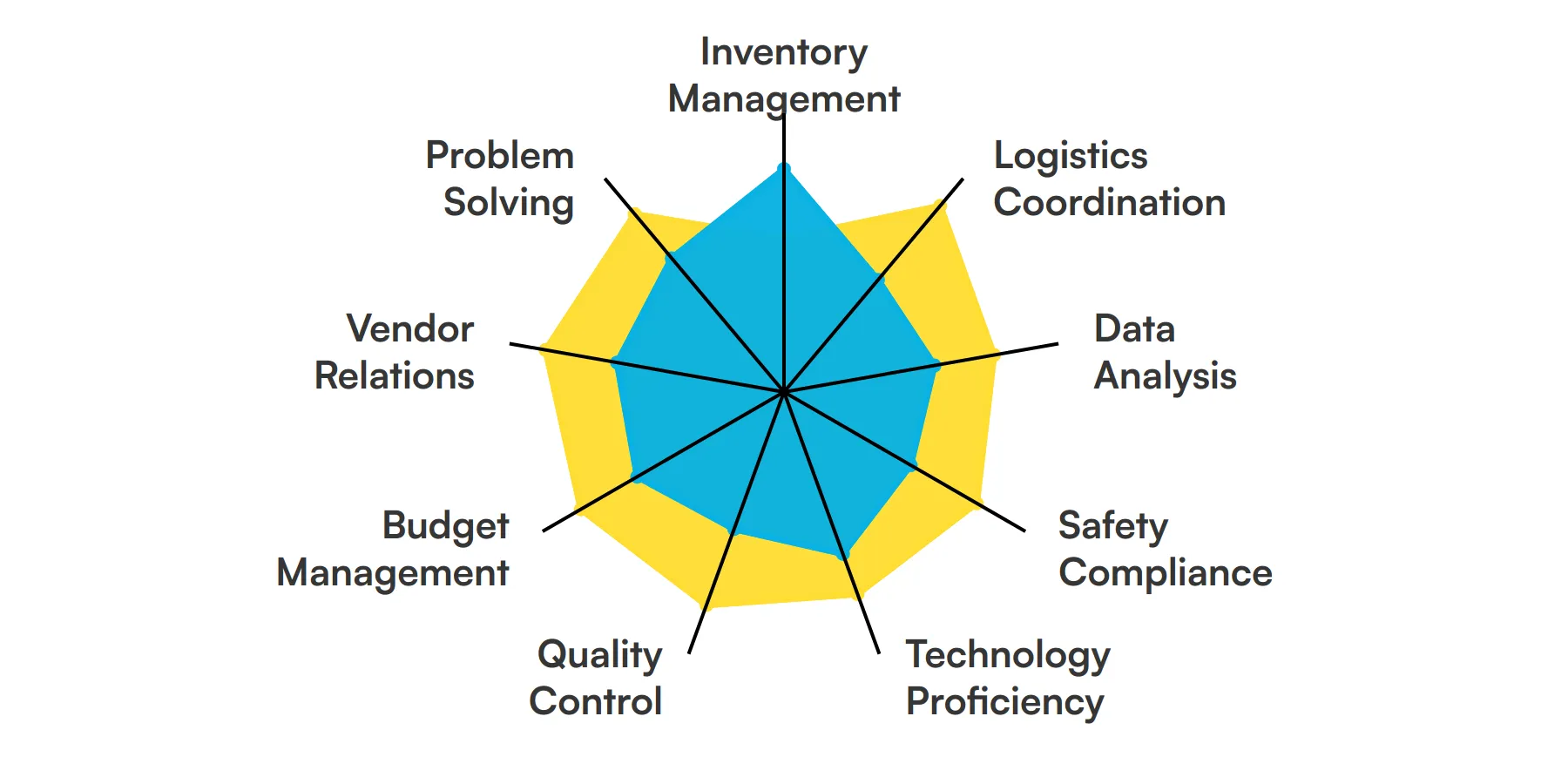
Inventory Management
A warehouse manager needs to keep track of stock levels, orders, and deliveries. This skill ensures that the right products are available at the right time, preventing overstocking or stockouts.
For more insights, check out our guide to writing a Warehouse Manager Job Description.
Logistics Coordination
Coordinating the movement of goods within the warehouse and to external locations is key. This involves planning routes, scheduling shipments, and ensuring timely delivery.
Data Analysis
Analyzing data helps in making informed decisions about inventory levels, order fulfillment, and overall warehouse efficiency. A warehouse manager uses data to identify trends and optimize operations.
Check out our guide for a comprehensive list of interview questions.
Safety Compliance
Ensuring that the warehouse adheres to safety regulations is crucial. This includes training staff on safety protocols, conducting regular inspections, and maintaining a safe working environment.
Technology Proficiency
Familiarity with warehouse management systems (WMS) and other relevant software is essential. This skill helps in automating processes, tracking inventory, and improving overall efficiency.
Quality Control
Maintaining high standards of quality for products stored and shipped from the warehouse is important. This involves regular inspections and implementing quality assurance processes.
For more insights, check out our guide to writing a Quality Assurance (QA) Engineer Job Description.
Budget Management
Managing the warehouse budget involves controlling costs, forecasting expenses, and ensuring that operations stay within financial limits. This skill helps in optimizing resource allocation.
Vendor Relations
Building and maintaining good relationships with suppliers and vendors is key. This ensures timely deliveries, favorable terms, and smooth operations.
Problem Solving
A warehouse manager often encounters unexpected issues. Being able to quickly identify problems and implement effective solutions is crucial for maintaining smooth operations.
Check out our guide for a comprehensive list of interview questions.
11 secondary Warehouse Manager skills and traits
The best skills for Warehouse Managers include Time Management, Communication, Team Collaboration, Adaptability, Attention to Detail, Customer Service, Negotiation, Training and Development, Project Management, Conflict Resolution and Forecasting.
Let’s dive into the details by examining the 11 secondary skills of a Warehouse Manager.
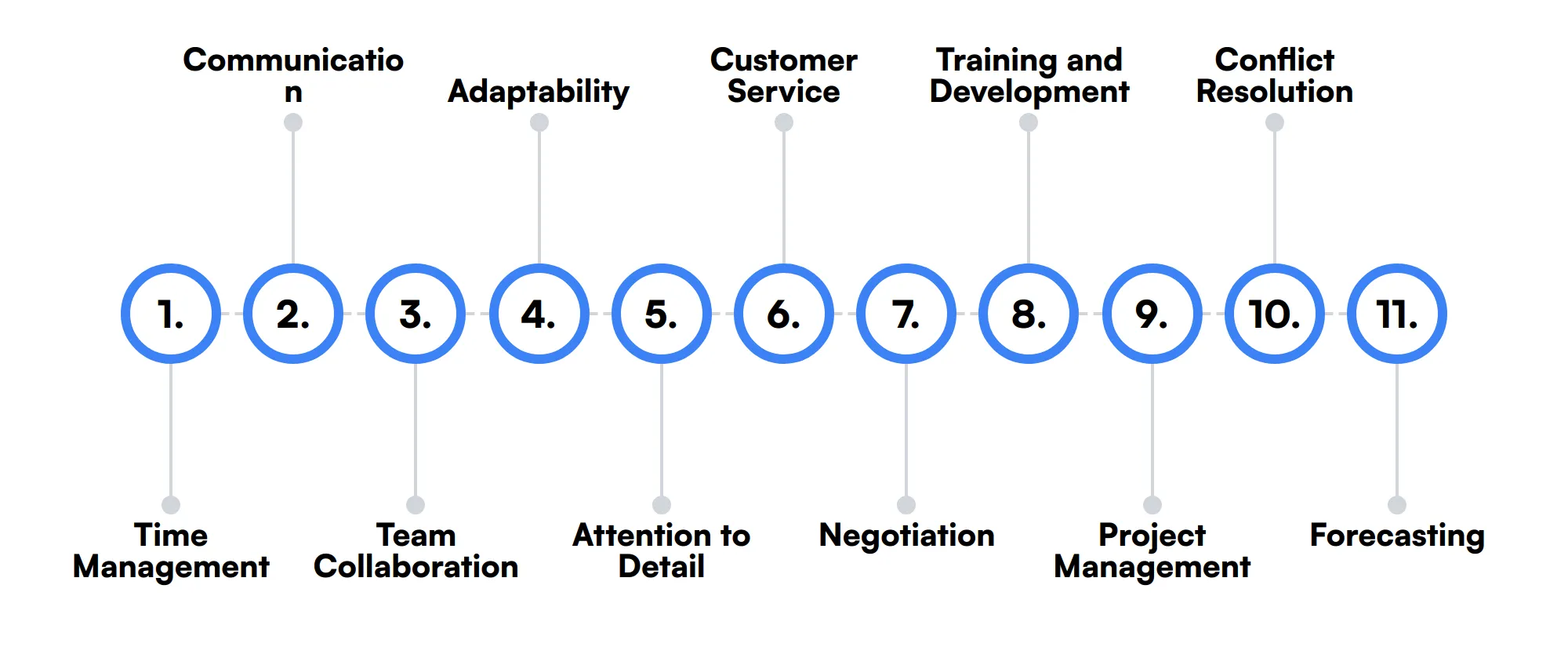
Time Management
Efficiently managing time ensures that all tasks are completed within deadlines, contributing to the overall productivity of the warehouse.
Communication
Clear communication with team members, suppliers, and other stakeholders is important for coordinating activities and ensuring everyone is on the same page.
Team Collaboration
Working well with others and fostering a collaborative environment helps in achieving common goals and improving overall warehouse performance.
Adaptability
Being able to adapt to changing circumstances and new challenges is important in a dynamic warehouse environment.
Attention to Detail
Paying close attention to details helps in identifying discrepancies, ensuring accuracy in inventory counts, and maintaining high standards of quality.
Customer Service
Providing excellent customer service ensures that clients are satisfied with the products and services, leading to repeat business and positive reviews.
Negotiation
Negotiating favorable terms with suppliers and vendors can lead to cost savings and better service agreements.
Training and Development
Investing in the training and development of warehouse staff helps in improving their skills and overall productivity.
Project Management
Managing projects, such as implementing new systems or processes, requires planning, coordination, and execution skills.
Conflict Resolution
Effectively resolving conflicts within the team or with external parties helps in maintaining a harmonious working environment.
Forecasting
Accurately predicting future inventory needs and demand trends helps in planning and ensuring that the warehouse is prepared for upcoming requirements.
How to assess Warehouse Manager skills and traits
Assessing the skills and traits of a Warehouse Manager is a multifaceted process. It involves understanding how well a candidate can handle inventory, coordinate logistics, manage budgets, and ensure safety compliance, among other responsibilities.
While resumes provide a snapshot of a candidate's experience, they do not fully reveal their proficiency in managing a complex warehouse environment. This is where practical assessments come into play. By implementing skill-based evaluations, you can measure a candidate's ability to navigate the challenges of warehouse management effectively.
Adaface assessments offer a tailored approach to evaluating the core competencies required for a Warehouse Manager. These tests are designed to reflect real-world scenarios that a manager might face, helping you identify candidates who are not only skilled but are also a good fit for your company's specific needs. With Adaface, you can achieve a 2x improvement in the quality of your hires and significantly reduce the time spent screening candidates.
Let’s look at how to assess Warehouse Manager skills with these 4 talent assessments.
Data Analysis Test
Our Data Analysis Test assesses a candidate's ability to handle, modify, analyze, and interpret data. The test uses scenario-based MCQ questions to screen for experience with analyzing data to find possible outcomes, detect anomalies, extract meaningful insights, project estimates, and visualize data using charts and graphs.
The test evaluates skills in data modelling, business analysis fundamentals, data interpretation, and SQL. Candidates are tested on their ability to work with data queries, perform data operations, and use popular data tools like Excel.
High-scoring candidates demonstrate proficiency in data investigations, including correlations and ranking, and can effectively interpret and visualize data using charts and graphs.

Basic Computer Skills Test
Our Basic Computer Skills Test evaluates a candidate's knowledge of fundamental computer skills, including data entry, Linux, Excel, computer programming aptitude, shell scripting, typing, system administration, and data analysis.
The test covers basic computer skills, data entry, Excel, typing, and system administration. Candidates are assessed on their ability to perform essential computer tasks and manage system operations.
Successful candidates show proficiency in using Excel for data manipulation and demonstrate strong typing skills, which are crucial for efficient data entry and system administration tasks.
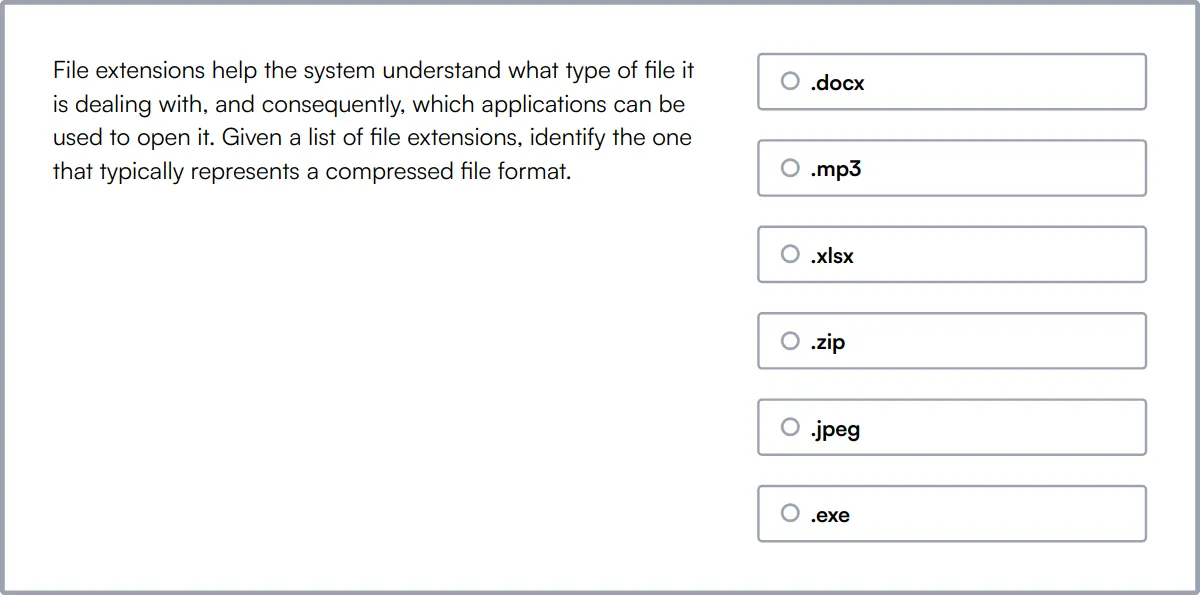
Financial Accounting Online Test
Our Financial Accounting Test uses scenario-based multiple-choice questions to evaluate a candidate's knowledge and skills related to financial statements and reporting, accounting principles and concepts, budgeting and forecasting, tax compliance and planning, auditing and internal controls, financial analysis and decision-making, and financial software and tools.
The test assesses understanding of financial statements, accounting principles, double-entry bookkeeping, assets and liabilities, income and expense recognition, and financial ratios. Candidates are evaluated on their ability to interpret and analyze financial data and apply accounting standards.
High-scoring candidates demonstrate strong skills in financial analysis, including cash flow statement preparation, inventory valuation, and understanding of depreciation and amortization.
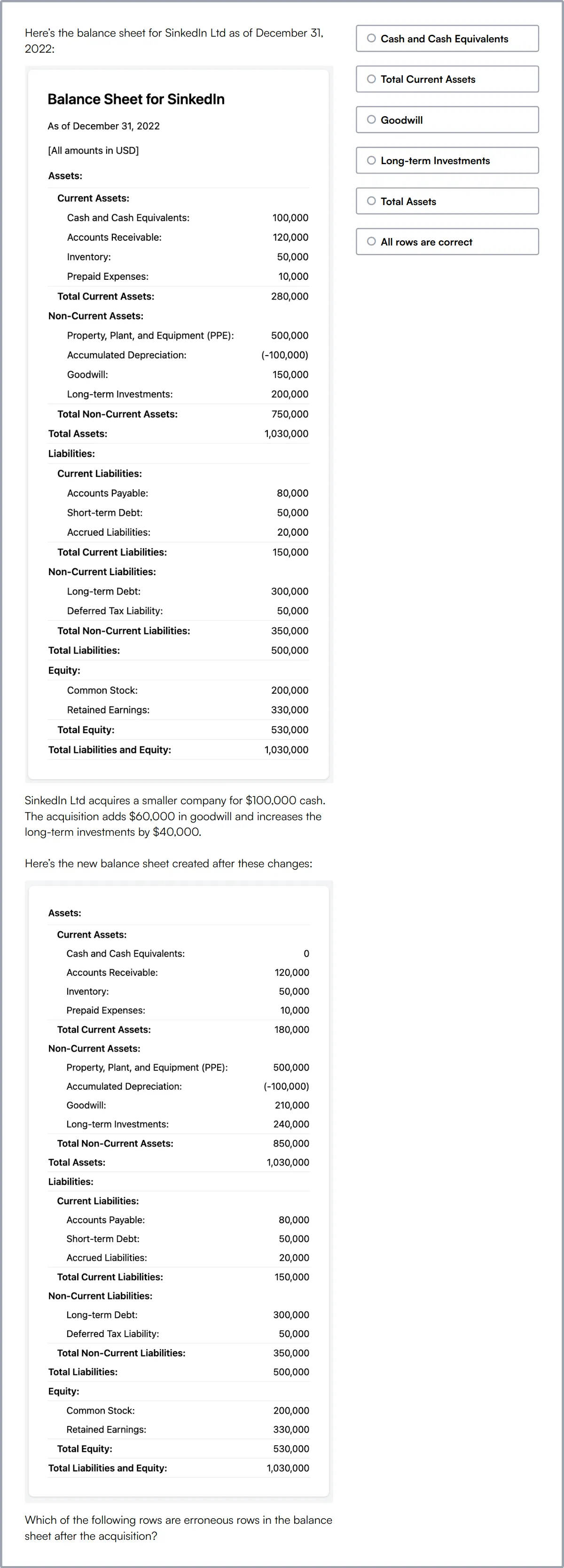
Problem Solving Test
Our Problem Solving Test evaluates a candidate's ability to understand instructions, analyze data, and respond to complex problems or situations. The questions are designed to get insights into their problem solving, learning agility, and coachability.
The test covers abstract reasoning, critical thinking, deductive reasoning, inductive reasoning, pattern matching, and spatial reasoning. Candidates are assessed on their ability to navigate through logical and data interpretation challenges.
High-scoring candidates show strong critical thinking and abstract reasoning skills, which are essential for effective problem-solving and decision-making in dynamic environments.
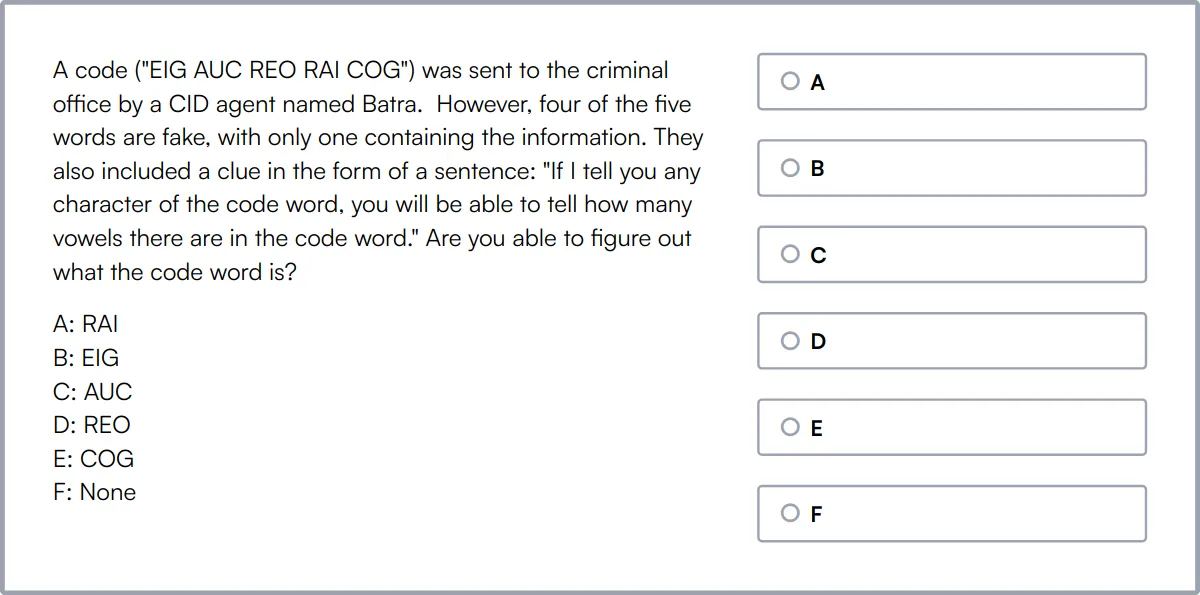
Summary: The 9 key Warehouse Manager skills and how to test for them
| Warehouse Manager skill | How to assess them |
|---|---|
| 1. Inventory Management | Evaluate accuracy in tracking and managing stock levels. |
| 2. Logistics Coordination | Assess ability to manage and optimize supply chain operations. |
| 3. Data Analysis | Check proficiency in interpreting and leveraging data insights. |
| 4. Safety Compliance | Review adherence to workplace health and safety regulations. |
| 5. Technology Proficiency | Test familiarity with relevant software and automation tools. |
| 6. Quality Control | Observe methods for maintaining product and service standards. |
| 7. Budget Management | Analyze skills in planning and controlling financial resources. |
| 8. Vendor Relations | Assess relationship management and negotiation with suppliers. |
| 9. Problem Solving | Evaluate approach to resolving unexpected challenges effectively. |
SAP WM Online Test
Warehouse Manager skills FAQs
What are the key skills required for a Warehouse Manager?
Key skills include Inventory Management, Logistics Coordination, Data Analysis, Safety Compliance, Technology Proficiency, and Quality Control.
How can recruiters assess Inventory Management skills?
Recruiters can assess Inventory Management skills through scenario-based questions, reviewing past experience, and evaluating familiarity with inventory software.
Why is Logistics Coordination important for a Warehouse Manager?
Logistics Coordination ensures timely and accurate movement of goods, which is critical for maintaining supply chain efficiency and customer satisfaction.
What methods can be used to evaluate a candidate's Data Analysis skills?
Methods include practical tests, reviewing past projects, and asking candidates to interpret warehouse data during interviews.
How do you assess a candidate's ability to ensure Safety Compliance?
Assess through questions about safety protocols, past incident management, and certifications in safety training.
What role does Technology Proficiency play in warehouse management?
Technology Proficiency helps in using warehouse management systems, automating tasks, and improving overall operational efficiency.
How can recruiters gauge a candidate's Problem Solving skills?
Gauge Problem Solving skills by presenting hypothetical warehouse issues and asking candidates to outline their approach to resolving them.
What are effective ways to assess Team Collaboration skills?
Effective ways include behavioral interview questions, reference checks, and evaluating past team project experiences.

40 min skill tests.
No trick questions.
Accurate shortlisting.
We make it easy for you to find the best candidates in your pipeline with a 40 min skills test.
Try for freeRelated posts



